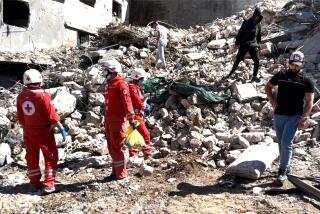A Bomb Turns Family’s Joy to Grief
GANIKHIL, Afghanistan — With a family wedding two days away and the Taliban’s front-line positions more than two miles up the road, Koko Gol probably thought the jet noise was someone else’s problem.
Gol was in a second-floor room of her home Saturday afternoon, sewing clothes for her brother-in-law’s wedding, as two U.S. fighter jets circled overhead, preparing to attack the Taliban.
Instead, a bomb landed on Gol’s home in a village controlled by the main U.S. allies here, the Northern Alliance. The blast killed Gol and seriously wounded her son and daughter, ages 5 and 6, along with at least seven other people.
“We were planning for the wedding of my brother, who is now injured and in the hospital,” said Gol’s husband, Mirza Khan, who was slightly injured and was still trembling from the blast almost a day later. “I was taking care of the sheep and goats outside when the bomb fell.”
On Sunday, the bomb’s aluminum tail fins, painted green, were scattered in the rubble of the home’s dried-mud bricks, which were blown to pieces that spilled into the garden in a torrent of debris.
The bombing was at least the fifth by U.S. jets on the wrong side of the front line north of Kabul, the Afghan capital. The Italian-run Emergency hospital for war wounded said three people died Saturday when a U.S. fighter jet struck Raqi, another alliance-held front-line village. The report could not be independently verified.
In addition, news reports from Kabul said 13 civilians were killed there Sunday when airstrikes aimed at the Taliban hit residential neighborhoods.
The mistaken attacks in Northern Alliance territory added to a sense among Afghans here that the United States is going about its strikes on the regime in the wrong way.
Saturday’s bombing of Ganikhil came on the heaviest day of airstrikes along the front line north of Kabul. During daylight Sunday, the skies were quieter than they had been in days. A single U.S. fighter jet streaked in around 4:20 p.m. to drop just one bomb, which struck Tota Khan, a hilltop Taliban outpost struck repeatedly over the last eight days.
Opposition Urges Closer Cooperation With U.S.
The accidental bombing of Northern Alliance territory showed the need for closer cooperation with U.S. forces, the alliance’s foreign minister, Abdullah, told reporters Sunday.
Saturday’s heavy airstrikes caused significant damage to the Taliban’s front-line troops, Abdullah said, calling for more days like it, rather than the break in airstrikes along the Kabul front Sunday.
“If [Saturday’s] type of bombing becomes the standard, the objective of the eradication of terrorism and the war against terror as a whole could be achieved much quicker--sooner rather than later,” Abdullah said.
“No American soldiers or security people are here to give directions to the airplanes,” added Naim Safi, the alliance’s deputy commander for the area around Ganikhil. “If there were any, there wouldn’t be these mistakes. We need to have some people with us to give them correct directions. Without that, it’s impossible to bomb Taliban targets properly.”
As the air war entered its fourth week without any clear sign that the Taliban was significantly weaker, doubts and rumors were growing along the front line here.
Many men in this male-dominated society were convinced that Saturday’s bombing had to be the fault of a female pilot. The rumor mill also fed suspicions that Pakistan, once the Taliban’s closest ally, was secretly using the United States to keep the opposition in check.
“Because it’s the first bombing like this, we accept that it was a mistake,” Safi said through an interpreter. “But if it continues like this many more times, it will not be an accident.”
Fayez Mohammed, 60, one of Gol’s neighbors, has seen soldiers come as saviors before, only to cause more harm than good. It was that way with the Taliban, who brought order in 1996 along with a harsh rule, he said. Then they went too far.
“We were happy to have peace,” Mohammed said. “We thought the Taliban was a good Muslim government. . . . But we didn’t know they would come and kill our children and take our daughters with them and destroy our houses.”
Now he is losing faith in the Americans in the sky too.
“We thought that the Americans were going to come and help us too, and now they are also making problems for us,” he said.
Village Elder Suggests Afghans Are to Blame
When about 50 men gathered to mourn with Gol’s husband at her funeral, a village elder tried to calm their anger at the U.S. bombing by suggesting that they had themselves to blame.
“The Americans come here, drop their bombs on Afghanistan and kill innocent people. . . . We cannot condone this, although we ourselves are guilty,” said the elder, Kamaruddin. “We were the ones to invite them here.”
Gol was laid to rest next to a child in a graveyard littered with old car parts, rusting pails and other trash. There are no markers to identify those buried there, but a local hospital director said one of Gol’s children had died previously.
Ganikhil is in a collection of villages called Aruqi, just southeast of the town of Golbahar. When the front line and the skies above are quiet, it is hard to imagine a more serene place in Afghanistan.
Ducks paddle in ancient irrigation canals, and a clear-flowing stream rushes down a chute fashioned from a dug-out tree to turn an old millstone that grinds wheat into flour. Farmers work their fields with wooden plows hitched to oxen, and children play along the dirt paths that join one village to the next.
All of the village’s men had to flee for three days last summer when the Taliban took control, but the regime quickly lost the village to the Northern Alliance again, Mohammed said, and life returned to normal--not full-scale war, but not real peace either.
Gol and her family had fled another front-line village for Ganikhil, where they rented a house about two months ago from a Mr. Wasil, who moved to Iran when the Taliban came into power in 1996, neighbors said.
Two families, about 15 people, lived in the rented house, which has a large garden and a courtyard that are now covered with dust and debris from the bomb blast. The explosion blew out most of the front wall and large sections of inner walls.
A clock on the wall of the second-story room where Gol was sewing shows the time over a picture of an idyllic waterfall. The hands are stopped at 4:25 p.m.
The force of the explosion ripped the door of Gol’s room off its frame and splintered it. But a collection of photographs, which neighbors said are of her two brothers-in-law, remains tacked to the wall, covered in dust.
The photos show the men standing on lush green lawns in front of colorful flowers. They look happy and well-off. One of the men is wearing a San Francisco 49ers T-shirt.
In her small corner of a country broken by war, perhaps those pictures were a window on paradise.
More to Read
Sign up for Essential California
The most important California stories and recommendations in your inbox every morning.
You may occasionally receive promotional content from the Los Angeles Times.










